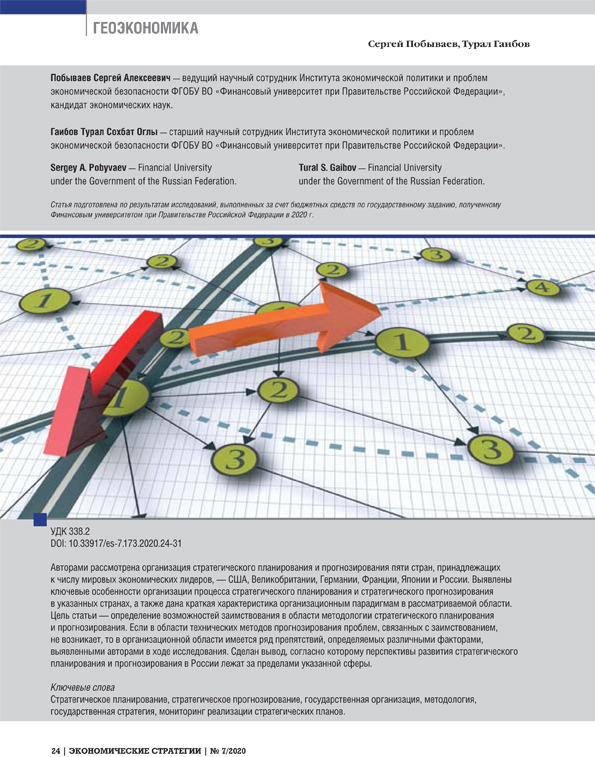Comparison of Methodologies for Strategic Forecasting and Planning of Economic Development in Developed Countries and Russia
DOI: 10.33917/es-7.173.2020.24-31
The authors considered the organization of strategic planning and forecasting of five countries that are among the world’s economic leaders — USA, Great Britain, Germany, France, Japan and Russia. The main features of the organization of the process of strategic planning and strategic forecasting in these countries are revealed, and a brief description of the organizational paradigms in the area under consideration is given. The purpose of the article is to determine the possibilities of borrowing in the field of methodology of strategic planning and forecasting. While there are no borrowing problems in the field of technical forecasting methods, there are a number of obstacles in the organizational field, determined by various factors. The authors identified nine such factors, and concluded that the prospects for the development of strategic planning and forecasting in Russia lie outside the directly specified area
References:
1. Konstantinovskaya L.V. Istoriya razvitiya prognozirovaniya [History of the Forecasting Development]. Moscow, Ekonomika, 2008.
2. Shakhova G.Ya., Manenyuk P.L. Dolgosrochnoe byudzhetnoe prognozirovanie v federal’nykh vedomstvakh SShA [Long-term Budget Forecasting in the US Federal Agencies]. Finansovyi zhurnal, 2014, no 3.
3. National Planning Policy Framework. Ministry of Housing, Communities and Local Government, 2019, February, available at: https://assets.publishing.service.gov.uk/government/uploads/system/uploads/attachment_data/file/6077/2116950.pdf.
4. Innovatsionnaya politika gosudarstva i strategicheskoe razvitie gorodov v usloviyakh krizisa: opyt Velikobritanii [Government Innovation Policy and Strategic Urban Development in the Context of Crisis: Experience of Great Britain]. Velikobritaniya, Birmingemskii universitet, 2009.
5. Sait pravitel’stva Velikobritanii, available at: https://www.gov.uk/government/policies.
6. Perspektivnoe byudzhetnoe planirovanie v mirovoi praktike [Prospective Budget Planning in World Practice]. Studbooks.net, available at: http://studbooks.net/72341/ekonomika/perspektivnoe_byudzhetnoe_planirovanie_mirovoy_praktike.
7. Chulkov A.S. Zarubezhnyi opyt postroeniya sistemy byudzhetirovaniya, orientirovannogo na rezul’tat [Foreign Experience in Creating Performance-oriented Budgeting System]. Finansy i kredit, 2010, no 46.
8. Research and Innovation Observatory — Horizon 2020 Policy Support Facility. European Commission, available at: https://rio.jrc.ec.europa.eu/en/organisations/commissariat-general-strategy-and-foresight-france-strat%C3%A9gie-cgsp.
9. Andryushevich O., Denisova I. Modeli formirovaniya natsional’nykh innovatsionnykh sistem [Patterns of Creating National Innovation Systems]. Kapital strany, 2013, September, 13, available at: https://kapital-rus.ru/articles/article/modeli_formirovaniya_nacionalnyh_innovacionnyh_sistem/
10. Kuepper J. A Brief History and Lessons of Japan’s Lost Decade. The Balance, available at: https://www.thebalance.com/japan-s-lost-decade-brief-historyand-lessons-1979056.
11. Cool Japan Strategy. Ministry of Economy, Trade and Industry, available at: http://www.meti.go.jp/english/policy/mono_info_service/creative_industries/pdf/120116_01a.pdf.
12. Japan Revitalization Strategy, available at: https://www.kantei.go.jp/jp/singi/keizaisaisei/pdf/honbunEN.pdf
13. Japan Vision 2050. Principles of Strategic Science and Technology Policy Toward 2020. Science Council of Japan, available at: http://www.scj.go.jp/en/vision2050.pdf.
14. Kontseptsiya dolgosrochnogo sotsial’no-ekonomicheskogo razvitiya Rossiiskoi Federatsii na period do 2020 goda [Concept of Long-term Socio-economic Development of the Russian Federation for the Period Until 2020]. Konsul’tantPlyus, available at: http://www.consultant.ru/document/cons_doc_LAW_82134/2
8c7f9e359e8af09d7244d8033c66928fa27e527/
15. Otchet o rezul’tatakh ekspertno-analiticheskogo meropriyatiya “Strategicheskii audit formirovaniya i dostizheniya pokazatelei deyatel’nosti federal’nykh organov ispolnitel’noi vlasti, rukovodstvo deyatel’nost’yu kotorykh osushchestvlyaet Pravitel’stvo Rossiiskoi Federatsii, v 2017–2018 godakh i istekshem periode 2019 goda” [Report on the Results of the Expert and Analytical Event “Strategic Audit of Forming and Achieving the Performance Indicators of Federal Executive Bodies, Controlled and Directed by the Government of the Russian Federation, in 2017–2018 and the past 2019”]. Schetnaya palata Rossiiskoi Federatsii, available at: https://ach.gov.ru/upload/iblock/885/8852a97cd45346ecea99d20b1d265d0f.pdf.
16. Pochemu v Rossii otsutstvuet sistema strategicheskogo planirovaniya [Why There is No Strategic Planning System in Russia]. Strategiya 24, 2020, February, 10, available at: https://strategy24.ru/rf/news/pochemu-v-rossii-otsutstvuet-sistema-strategicheskogo-planirovaniya.
17. Bochanov M.A., Starykh N.P. Imidzh Rossii v sovremennykh geopoliticheskikh usloviyakh [Image of Russia in Modern Geopolitical Conditions]. Srednerusskii vestnik obshchestvennykh nauk, 2015, no 2, p. 78.
18. Gosudarstvo i goskompanii kontroliruyut 70% rossiiskoi ekonomiki [The State and State-owned Companies Control 70% of the Russian Economy]. Vedomosti, 2016, September, 29, available at: https://www.vedomosti.ru/economics/articles/2016/09/29/658959-goskompanii-kontroliruyut-ekonomiki.
19. 2019 Global Go To Think Tank Index Report. University of Pennsylvania, available at: https://repository.upenn.edu/cgi/viewcontent.cgi?article=1018&context=think_tanks.
20. Ekonomist Belousov otsenil veroyatnost’ prevrashcheniya RF v syr’evoi pridatok [The Economist Belousov Estimated the Probability of Russia Turning into a Raw Material Appendix]. Izvestiya, 2020, June, 4, available at: https://iz.ru/1019493/2020-06-04/ekonomist-belousov-otcenil-veroiatnost-revrashcheniiarf-
v-syrevoi-pridatok.
21. Ageev A.I., Kuroedov B.V., Met’yuz R., Sandarov O.V. Metodologiya strategicheskoi matritsy [Strategic Matrix Methodology]. Moscow, Institut ekonomicheskikh strategii, 2004, 152 p. (Strategicheskoe prevoskhodstvo. Seriya MLSU.)
22. Ageev A.I., Kuroedov B.V., Met’yuz R., Sandarov O.V. Strategicheskaya matritsa kompanii [Company Strategic Matrix]. Ekonomicheskie strategii, 2007, no 8, pp. 90–97.



